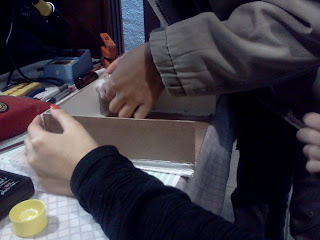terça-feira, 12 de junho de 2012
Linha do Tempo
Fotos desde o início da montagem até o final
Primeiros passos, montagem do cubo 2x2x2 e 3x3x3
Cubo 2x2x2
Cubo 3x3x3
Soldando camadas do cubo 7x7x7
Camada do cubo 7x7x7
Soldando entre si, as camadas do cubo 7x7x7
Cubo 7x7x7
Testando todos os 343 LEDs
Foi necessário testar várias vezes TODOS os LEDs
Soldando os fios nas colunas do cubo 7x7x7
Cortando e descascando os fios
Testando novamente os LEDs
Ligando os fios do cubo 7x7x7
Acredite, atrás dessa floresta de fios, está o cubo 7x7x7
Circuito melhorado com a diminuição do volume dos fios
Cortando madeira para a caixa
Colando a caixa
Fazendo caixa de acetato para proteger o cubo
Testando cubo 7x7x7
O pouco do material que sobrou
Protótipo da versão do programa criador de frames de um cubo 7x7x7
segunda-feira, 11 de junho de 2012
Material
Material usado no projeto:
- 70 LEDs para a montagem dos cubos pequenos (2x2x2 e 3x3x3) para teste (Santa Efigênia)
- Sugador
R$15,00
- Alicates
- Fonte externa
- 70 LEDs para a montagem dos cubos pequenos (2x2x2 e 3x3x3) para teste (Santa Efigênia)
R$10,00
- 343 LEDs para a montagem do cubo 7x7x7 (Santa Efigênia)
R$68,40
- 6 Transistors
R$1,20
- 1 Decodificador
R$2,50
- 6 Flip-flop
R$9,00
- 69 Resistores
R$6,90
- 3 Estanho
R$13,50
R$13,50
- Acetato
R$7,90
- Sugador
R$15,00
- 20m Fios
R$30,00
- Arduino (Laboratório de Garagem - Rua Berta, 60 - Vila Mariana São Paulo, 04120-040)
R$ 89,00
- Protoboard 3220 pontos/furos (Santa Efigênia)
R$ 66,60
- Madeira
- Ferro de solda 30W
- Alicates
- Fonte externa
Código do Cubo
#include <avr/pgmspace.h> // allows use of PROGMEM to store patterns in flash
#define CUBESIZE 7
#define PLANESIZE CUBESIZE*CUBESIZE
#define PLANETIME 3333 // time each plane is displayed in us -> 100 Hz refresh
#define TIMECONST 20 // multiplies DisplayTime to get ms - why not =100?
prog_uchar PROGMEM PatternTable[] = {
B1111111, B0000000, B1000001, B1100011, B1010101, B1001001, B0000000,10,
B1111111, B0000000, B1000001, B1100011, B1010101, B1001001, B0000000,10,
B1111111, B0000000, B1000001, B1100011, B1010101, B1001001, B0000000,10,
B1111111, B0000000, B1000001, B1100011, B1010101, B1001001, B0000000,10,
B1111111, B0000000, B1000001, B1100011, B1010101, B1001001, B0000000,10,
B1111111, B0000000, B1000001, B1100011, B1010101, B1001001, B0000000,10,
B1111111, B0000000, B1000001, B1100011, B1010101, B1001001, B0000000,10,
};
/*
** Defining pins in array makes it easier to rearrange how cube is wired
** Adjust numbers here until LEDs flash in order - L to R, T to B
** Note that analog inputs 0-5 are also digital outputs 14-19!
** Pin DigitalOut0 (serial RX) and AnalogIn5 are left open for future apps
*/
//int LEDPin[] = {16, 3, 1, 15, 4, 6, 14, 5, 7};
int LEDPin[] = {0,1,2,3,4,5,6};
//int PlanePin[] = {19, 18, 17};
int PlanePin[] = {12,13,14,15,16,17,18};
int decodificador[]={8,9,10};
// initialization
void downClock(int valor){
int binario[3], j=0, i=0, resto=0;
for(j=2; j>=0;j--){
resto=valor%2;
valor=valor/2;
printf("%d\n",resto);
binario[j]=resto;
}
for(i=0; i<3;i++){
digitalWrite(decodificador[i],binario[i]);
}
}
void upClock(){
digitalWrite(16,HIGH);
digitalWrite(17,HIGH);
digitalWrite(18,HIGH);
}
void limpaFlip(){
int i=0;
for(int j=1;j<=7;j++){
digitalWrite(PlanePin[j],LOW);
for(i=0; i<7;i++){
digitalWrite(LEDPin[i],LOW);
}
upClock();
downClock(j);
}
}
void setup()
{
int pin; // loop counter
// set up LED pins as output (active HIGH)
for (pin=0; pin<PLANESIZE; pin++) {
pinMode( LEDPin[pin], OUTPUT );
}
// set up plane pins as outputs (active LOW)
for (pin=0; pin<CUBESIZE; pin++) {
pinMode( PlanePin[pin], OUTPUT );
}
}
// display pattern in table until DisplayTime is zero (then repeat)
void loop()
{
// declare variables
byte PatternBuf[ PLANESIZE ]; // saves current pattern from PatternTable
int PatternIdx;
byte DisplayTime; // time*100ms to display pattern
unsigned long EndTime;
int plane; // loop counter for cube refresh
int patbufidx; // indexes which byte from pattern buffer
int ledrow; // counts LEDs in refresh loop
int ledcol; // counts LEDs in refresh loop
int ledpin; // counts LEDs in refresh loop
// Initialize PatternIdx to beginning of pattern table
PatternIdx = 0;
// loop over entries in pattern table - while DisplayTime>0
//limpaFlip();
do {
memcpy_P( PatternBuf, PatternTable+PatternIdx, PLANESIZE );
PatternIdx += PLANESIZE;
DisplayTime = pgm_read_byte_near( PatternTable + PatternIdx++ );
EndTime = millis() + ((unsigned long) DisplayTime) * TIMECONST;
// loop while DisplayTime>0 and current time < EndTime
while ( millis() < EndTime ) {
patbufidx = 0; // reset index counter to beginning of buffer
// loop over planes
for (plane=1; plane<=CUBESIZE; plane++) {
digitalWrite( PlanePin[plane], HIGH );
// load current plane pattern data into ports
ledpin = 0;
for (ledrow=0; ledrow<CUBESIZE; ledrow++) {
for (ledcol=0; ledcol<CUBESIZE; ledcol++) {
ledpin=+1;
digitalWrite( LEDPin[ledpin], PatternBuf[patbufidx] & (1 << ledcol) );
}
downClock(ledrow);
upClock();
ledpin=0;
patbufidx++;
}
// turn current plane on
digitalWrite( PlanePin[plane], LOW);
// delay PLANETIME us
delay(10000);
delayMicroseconds( PLANETIME );
} // for plane
} // while <EndTime
}
while (DisplayTime > 0);
//limpaFlip();
}
Assinar:
Comentários (Atom)












































